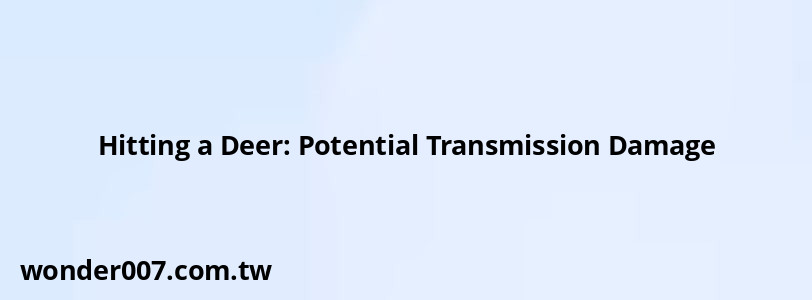Hitting a Deer: Potential Transmission Damage

Transmission Impact
Hitting a deer can indeed cause transmission problems. The force of impact from colliding with a large animal like a deer can potentially damage various components of your vehicle, including the transmission. While the most visible damage often occurs to the front end of the car, the impact can reverberate through the entire vehicle, affecting internal systems.
Types of Transmission Damage
Direct Impact Damage
In severe collisions, the deer's body can directly impact the transmission, especially in vehicles with front-wheel drive where the transmission is located near the front of the car. This direct hit can cause immediate mechanical damage to the transmission housing or internal components.
Indirect Damage
Even if the transmission isn't directly hit, the force of the collision can cause:
- Misalignment of transmission components
- Damage to transmission mounts
- Stress on internal gears and bearings
Fluid-Related Issues
A deer collision might cause damage to the transmission fluid system:
- Cracked transmission fluid lines
- Damaged transmission cooler (often integrated with the radiator)
- Leaks in the transmission housing
These issues can lead to fluid loss, which if unaddressed, can result in severe transmission damage.
Signs of Transmission Damage After Hitting a Deer
Watch for these symptoms after a deer collision:
- Unusual noises (whining, clunking, or grinding)
- Difficulty shifting gears
- Slipping gears or loss of power
- Transmission fluid leaks
- Check engine or transmission warning lights
What to Do After Hitting a Deer
1. Pull over safely and turn on hazard lights
2. Check for injuries and call emergency services if needed
3. Inspect your vehicle for visible damage
4. Look for fluid leaks under the car
5. If safe to do so, drive to a nearby service station or call for a tow
6. Have your vehicle thoroughly inspected by a professional mechanic
Prevention and Protection
While it's not always possible to avoid deer collisions, you can minimize risk and potential damage:
- Stay alert, especially during dawn and dusk
- Use high beams when appropriate
- Slow down in deer-prone areas
- If you see one deer, expect more nearby
- Consider installing a sturdy front bumper guard
Insurance Considerations
Many comprehensive auto insurance policies cover deer collisions. However, it's crucial to have your vehicle, including the transmission, thoroughly inspected after an accident. Some transmission damage may not be immediately apparent but could worsen over time if left unaddressed.
FAQs About Deer Collisions and Transmission Damage
- Can a minor deer collision cause transmission damage?
Yes, even a seemingly minor collision can potentially cause transmission issues due to the complex nature of vehicle drivetrains. - How soon after hitting a deer should I get my transmission checked?
It's best to have your vehicle, including the transmission, inspected as soon as possible after a deer collision, ideally within 24-48 hours. - Will my insurance cover transmission damage from hitting a deer?
Most comprehensive insurance policies cover deer collisions, including resulting transmission damage. However, it's best to check with your specific insurance provider.
Related Posts
-
2012 Hyundai Sonata Hybrid Transmission Issues
27-01-2025 • 292 views -
Miata: Years to Avoid for Potential Buyers
26-01-2025 • 285 views -
Jeep Grand Cherokee Transmission Over Temp: Causes & Fixes
30-01-2025 • 203 views -
Transmission in a 1999 Chevy 3500: Options and Details
29-01-2025 • 233 views -
Toyota Prius: Transmission Fluid Change Cost Breakdown
29-01-2025 • 219 views
Latest Posts
-
2015 Chevy Traverse AC Recharge Port Location
01-02-2025 • 520 views -
Are O2 Sensors Covered Under Warranty
01-02-2025 • 483 views -
How To Turn Off Paddle Shifters Mercedes
01-02-2025 • 494 views -
Power Steering Fluid Leak On Passenger Side
01-02-2025 • 569 views -
Rear Brake Caliper Piston Won't Compress
01-02-2025 • 451 views
Popular Posts
-
EPC Light: Understanding Causes and Solutions
26-01-2025 • 1176 views -
Hino Warning Lights: Understanding Dashboard Alerts
26-01-2025 • 997 views -
Toyota Hiace: Fuel Efficiency Insights for 2025
26-01-2025 • 841 views -
V12 Engine Costs: What You Need to Know
26-01-2025 • 807 views -
BMW X5: Fuel Tank Capacity and Specifications
28-01-2025 • 772 views
